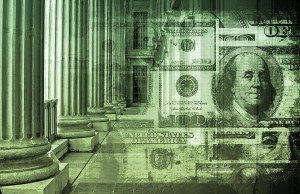

Wall Street watchdogs rolled out a long-anticipated overhaul of the Volcker Rule that eases its controversial restriction on banks making speculative investments, wrapping up a top de-regulatory goal of officials appointed by President Donald Trump.
The changes seek to provide lenders a much clearer picture of what trades are prohibited, giving firms confidence to engage in transactions without fear of violating the rule. The Office of the Comptroller of the Currency approved the revamp earlier Tuesday with Federal Deposit Insurance Corp. slated to follow. Three other financial regulators responsible for Volcker are expected to sign off in the coming days.
 The Volcker rewrite marks a major victory for Wall Street, especially Goldman Sachs Group Inc., which has lobbied aggressively to weaken the rule for years. But the changes are more marginal than major, raising questions about how much they might revive trading. Without action by Congress, Volcker’s prohibition on proprietary trading — the practice of banks making market bets with their own money — stands. And lenders still face restrictions on investing in private equity and hedge funds.
The Volcker rewrite marks a major victory for Wall Street, especially Goldman Sachs Group Inc., which has lobbied aggressively to weaken the rule for years. But the changes are more marginal than major, raising questions about how much they might revive trading. Without action by Congress, Volcker’s prohibition on proprietary trading — the practice of banks making market bets with their own money — stands. And lenders still face restrictions on investing in private equity and hedge funds.
A response to the 2008 financial crisis, Volcker was meant to address concerns that some bank trading desks behaved like hedge funds before the meltdown, using their firms’ balance sheets to finance risky wagers. Former Federal Reserve Chairman Paul Volcker, its key advocate, said such trading could sink banks and threaten the broader economy. The rule was included in the 2010 Dodd-Frank Act, with regulators putting it in place three years later.
Exceedingly Complex
Almost since the ink was dry, banks have complained that Volcker was exceedingly complex, making the rule difficult to comply with. So regulators picked by Trump arrived at their agencies with a strong interest in simplifying the rule. The revamp, known as Volcker 2.0, is part of a steady effort to soften regulations during his administration. While watchdogs haven’t ripped up the post-crisis rule book, critics argue that taken together, the changes will insert renewed risk into the financial system.
What watchdogs came up with on Volcker relies on what’s known as the market-risk prong to determine which transactions are prohibited for banks with more than $1 billion of trading activity. That standard is something large banks already use and understand, so theoretically, it will be easier for them to determine in real time whether a trade is banned. The changes take effect Jan. 1, 2020, but banks will have another year to comply.
In one of the biggest changes, banks will no longer be assumed to be engaging in banned trades when they conduct short-term transactions. The so-called rebuttable presumption was one of Wall Street’s most-hated aspects of the original Volcker Rule.
In another assist to banks, regulators provide more clarity on market making — the permitted practice under Volcker of engaging in trades on behalf of clients. Specifically, watchdogs gave lenders a clear limit for assets held in their market-making portfolios that will allow firms to get right up to the line without fear of violating Volcker.
Hedge Funds
Regulators also provided some flexibility on restrictions on investing in private equity and hedge funds. Banks will now have more freedom to do so if the investments are done on behalf of clients.
The changes to the five-agency rule also have to be approved by the Fed, Securities and Exchange Commission and Commodity Futures Trading Commission.
With the bulk of Volcker out of the way, there are a number of other Wall Street rules awaiting attention — many of them being handled by the Fed. They include significant shifts in bank capital rules and leverage limits, plus fundamental changes to the Fed’s annual stress tests.
–With assistance from Yalman Onaran.